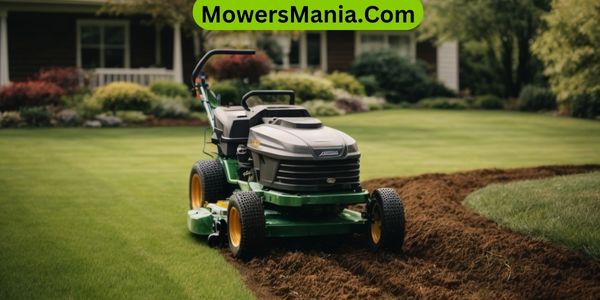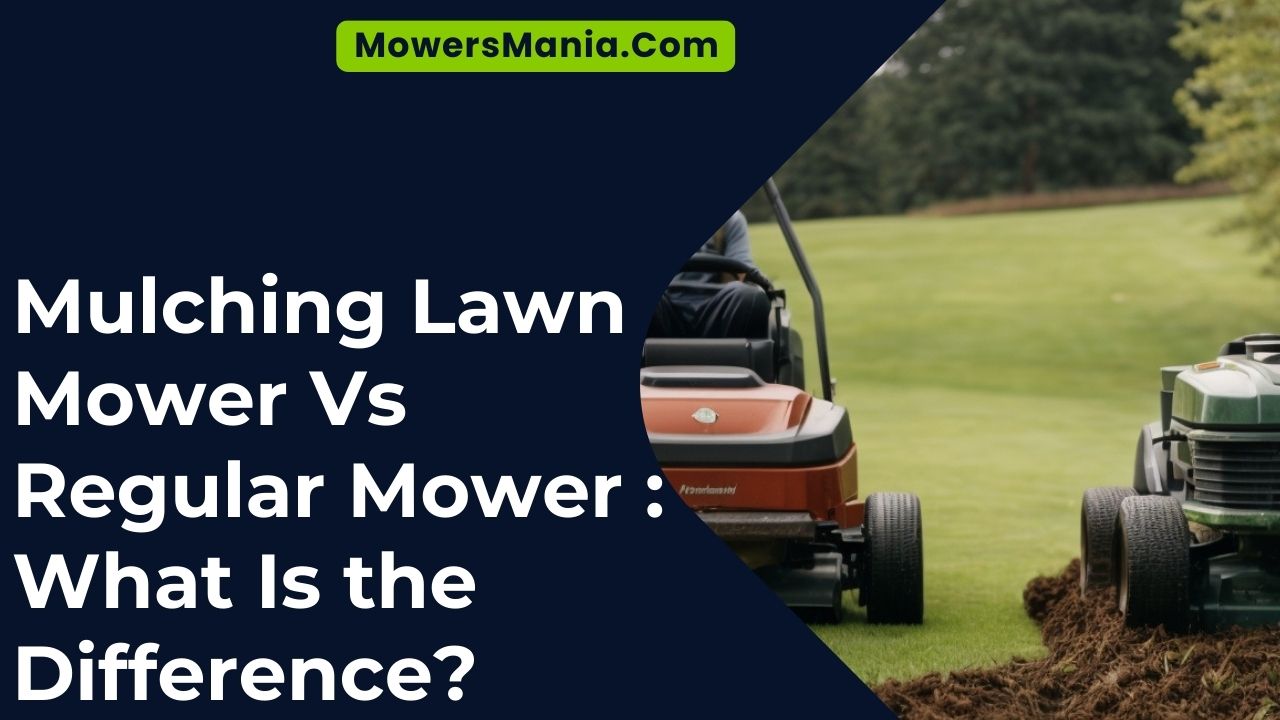Looking to level up your lawn care game? Curious about the difference between a mulching lawn mower and a regular mower? We’ve got you covered.
In this article, we’ll break down how these mowers work, the impact on your lawn’s health, and the maintenance each requires.

So, if you’re ready to make an informed decision on which mower is best for your yard, keep reading!
Mulching Lawn Mowers: How They Work
When using a mulching lawn mower, the machine finely cuts grass clippings and deposits them back onto the lawn, providing natural nutrients for the soil and promoting a healthier lawn. This process is different from traditional mowers that collect and bag clippings for disposal.
The finely chopped grass clippings released by the mulching mower are small enough to fall between the grass blades, where they decompose quickly.
As a result, the clippings act as a natural fertilizer, returning essential nutrients like nitrogen and potassium to the soil. This not only saves you time and effort but also enhances the overall health of your lawn.
Additionally, the mulch helps to regulate soil temperature, retain moisture, and reduce weed growth. By returning the clippings to the lawn, the mulching mower supports a sustainable approach to lawn care, reducing the need for chemical fertilizers and promoting a more eco-friendly maintenance routine.
Regular Mowers: Cutting Mechanism
If you opt for a regular mower, its cutting mechanism involves collecting and bagging grass clippings for disposal, rather than finely cutting and depositing them back onto the lawn like a mulching mower. Regular mowers typically come with a built-in bagging system that gathers the grass clippings as you mow.
This cutting mechanism is designed to give your lawn a clean and well-manicured appearance by removing the clippings from the surface.
The bagging system allows you to easily dispose of the clippings, either by composting them or throwing them away. Some regular mowers also offer the option to attach a side discharge chute, which allows the clippings to be expelled from the mower’s side, further facilitating the disposal process.
However, it’s important to note that this cutting mechanism means that the valuable nutrients from the grass clippings aren’t returned to the soil, as they’re with a mulching mower. Therefore, regular mowers may require additional fertilization to compensate for the loss of these nutrients.
Grass Clippings: Disposal and Benefits

You should regularly mulch your grass clippings to provide essential nutrients to your lawn. Mulching grass clippings is a beneficial practice that can help improve the health and appearance of your lawn.
When you mulch the clippings, they break down and return important nutrients, such as nitrogen, potassium, and phosphorus, back into the soil.
This natural process helps to promote healthy grass growth and reduces the need for additional fertilizers. Additionally, leaving the clippings on the lawn can help improve moisture retention and reduce the evaporation of water from the soil.
This can be especially beneficial during hot and dry periods, as it helps to keep the lawn hydrated and healthy.
To better understand the benefits of mulching grass clippings, take a look at the table below:
| Benefits of Mulching Grass Clippings |
|---|
| Returns essential nutrients to the soil |
| Promotes healthy grass growth |
| Reduces the need for additional fertilizers |
| Improves moisture retention in the soil |
| Helps keep the lawn hydrated and healthy |
Lawn Health: Impact of Different Mowers
To maintain a healthy lawn, regularly mow with a mulching lawn mower to effectively return essential nutrients to the soil.
Mulching mowers finely chop grass clippings and deposit them back onto the lawn, where they decompose and release vital nutrients, such as nitrogen, back into the soil. This natural fertilization process helps to promote healthy grass growth and overall lawn health.
In contrast, regular mowers collect and remove grass clippings, depriving the soil of these beneficial nutrients. Using a regular mower may require additional fertilization to compensate for the loss of nutrients from the removed clippings.
This can result in increased maintenance and costs. Moreover, the constant removal of grass clippings can disrupt the natural ecological balance of the soil and lead to a higher demand for synthetic fertilizers.
In addition to the nutrient benefits, mulching mowers also help in retaining moisture in the soil by creating a protective layer of organic matter. This can be particularly advantageous during dry periods, as it reduces the need for excessive watering.
Maintenance: Care Requirements for Each

When transitioning to the subtopic of Maintenance: Care Requirements for Each, continue the discussion by addressing the specific upkeep needs of mulching lawn mowers and regular mowers.
Mulching lawn mowers and regular mowers have distinct care requirements that are essential for their efficient functioning and longevity.
- Blade Maintenance: Mulching mowers require regular sharpening of the blades to ensure fine mulch production, while regular mowers may need less frequent blade maintenance.
- Cleaning: Both types of mowers need regular cleaning to prevent grass buildup and corrosion, but mulching mowers may require more thorough cleaning to avoid clogging and maintain proper mulching function.
- Mulch Plug: Mulching mowers come with a mulch plug that needs to be properly installed for mulching operation and removed for side-discharge or bagging. This plug requires regular inspection and cleaning to prevent blockages.
- Air Filter: Regular mowers commonly feature air filters that need regular replacement, while mulching mowers may have specific air filter requirements for optimal mulching performance.
- Mulching Blade: Mulching mowers have specially designed mulching blades that need to be checked for wear and tear and replaced as necessary to maintain effective mulching.
Frequently Asked Questions (FAQs)
Can a Regular Mower Be Converted Into a Mulching Mower?
You can convert a regular mower into a mulching mower by attaching a mulching kit. This kit includes a special mulching blade and a plug to close off the side discharge. It’s a simple upgrade.
Are There Any Specific Types of Grass That Benefit More From Mulching Mowers?
Yes, some grass types benefit more from mulching mowers. For example, fine fescue and Kentucky bluegrass thrive with this method. It’s essential to consider your grass type when choosing a mower for optimal results.
What Is the Environmental Impact of Using a Regular Mower Versus a Mulching Mower?
Using a regular mower can produce more emissions and waste because it requires frequent disposal of grass clippings. On the other hand, a mulching mower recycles clippings, reducing environmental impact and promoting healthier grass growth.
Can Mulching Mowers Handle Wet Grass Better Than Regular Mowers?
Yes, mulching mowers handle wet grass better than regular mowers. They have specially designed blades and decks that chop the grass into fine pieces, allowing it to decompose quickly. This helps prevent clumping and keeps your lawn healthier.
Are There Any Safety Concerns When Using a Mulching Mower Compared to a Regular Mower?
When using a mulching mower, be cautious of debris flying out. Always wear protective gear and keep pets and children at a safe distance. With a regular mower, be mindful of the discharge chute and avoid mowing on steep slopes.
Conclusion
So, when it comes down to it, the main difference between a mulching lawn mower and a regular mower is the way they handle grass clippings.
Mulching mowers chop the clippings into fine pieces and return them to the lawn, providing natural nutrients.
Regular mowers, on the other hand, simply collect and dispose of the clippings.
Both have their own benefits and it ultimately comes down to your lawn care preferences and maintenance routine.



